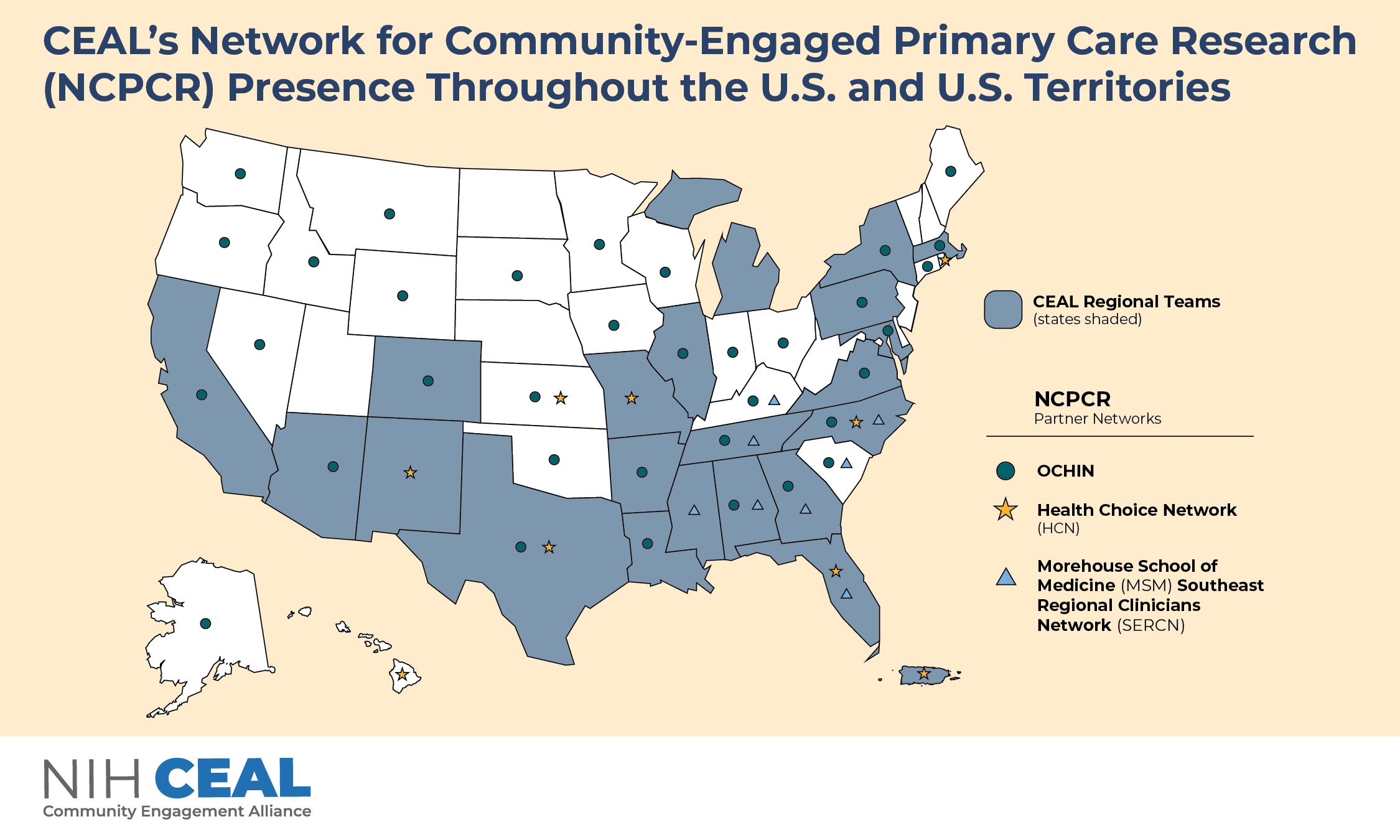Promoting Community-Engaged Research in Primary Care
PROGRAM OVERVIEW
The Network for Community-Engaged Primary Care Research (NCPCR) aligns with the mission of the National Institutes of Health Community Engagement Alliance (CEAL) program by using community-engaged research in primary care settings. The NCPCR team designs and tests interventions to address differences in health outcomes and improve participation in research.

NCPCR Objectives
1. Support research studying awareness, education, and health information needs for biomedical research.
2. Encourage people experiencing health challenges to contribute to biomedical research by participating in clinical studies and trials.
NCPCR Components
NCPCR has two components: a data ecosystem and a clinical trial.
The NCPCR Data Ecosystem includes information from community health centers (CHCs) providing primary care to patients often left out of clinical research opportunities. The NCPCR Data Ecosystem uses data warehouse capabilities and electronic health record data elements (demographic, clinical, and social determinants of health [SDOH] measures) to centralize data for randomized controlled trials in CEAL communities.
Researchers across CEAL may benefit from using these data in their work. The NCPCR Cohort Discovery was created to help. This free, web-based, drag-and-drop interface allows queries of the NCPCR Data Ecosystem to estimate patient cohort size and demographic distribution for preparatory-to-research purposes.
The randomized clinical trial (registered on ClinicalTrials.gov), Community Health Workers Systematically Assessing and Addressing Social Determinants of Health to Improve Outcomes In Community-based Health Centers (CHW-SYSTIM), collaborates with community health workers (CHWs) in CHCs to identify patients with uncontrolled diabetes or hypertension who have challenges coping with chronic disease. These challenges, often referred to as social needs, may include accessing regular health care, healthy food, dependable transportation, or a reliable source of income. CHWs support patients by referring them to local social service organizations.
What Does NCPCR Offer?
Social risks and social needs can contribute to poorer health outcomes and barriers to care. By understanding the impact of SDOH on chronic diseases while implementing prevention and intervention studies, geographically located CEAL communities can improve outcomes.
Chronic diseases, such as hypertension, heart disease, cancer, and diabetes, also increase the cost of health care. Many of these chronic conditions and their risk factors can be prevented or delayed when detected and treated early if patients work closely with their primary care providers. Primary care providers are trusted voices in preventing and treating chronic diseases. More research is needed to assess the role of health care systems, especially primary care settings, in improving the delivery of chronic disease preventive services in settings such as practice-based research networks, Federally Qualified Health Centers, CHCs, rural health clinics, and other points of care.
Community-engaged research is an effective, sustainable strategy for care providers to understand how best to deliver primary care in communities facing health barriers and challenges. Transforming primary care settings to promote community-engaged research will help to close care gaps while implementing innovative, scientifically rigorous research to prioritize prevention and manage complex health and social needs across the primary care continuum.
For these reasons, NCPCR offers:
- Rigorous evidence-based intervention research in primary care settings to address SDOH and chronic disease
- Innovative strategies that improve health care delivery in the primary care setting, including gaps in prevention and treatment, with the goal of reducing challenges in access to care, quality of care, and health outcomes in CEAL communities
- Improved health outcomes and stronger community partnerships through community-engaged research in primary care settings
- Community engagement through partnerships with CHCs and community-based organizations
- Integrated systems to encourage the participation of populations experiencing health challenges in clinical studies and trials
- Data from electronic health records to promote data interoperability for public health
- A novel infrastructure for practice-based research across a national network of Federally Qualified Health Centers and CHCs
- Collaboration with communities to address their priorities, including financial support for CHCs, primary care associations, and other health care partners

NCPCR Awardees
Morehouse School of Medicine
Morehouse School of Medicine (MSM) is among the nation’s leading educators of primary care physicians and is recognized for its social work. MSM coordinates the Southeast Regional Clinicians Network (SERCN), which includes over 200 Federally Qualified Health Centers, more than 1,700 clinical sites, and 8 state primary care associations serving over 4 million patients. MSM also partners with the Health Choice Network (HCN), a nonprofit organization providing health information technology services to 60 safety-net health care organizations that serve 3 million patients in 20 U.S. states and territories.
OCHIN
OCHIN is a nonprofit leader in health care innovation and a trusted partner in a growing national network of providers. With the country’s largest collection of community health data and more than 20 years of practice-based research and solutions expertise, OCHIN provides the clinical insights and tailored technologies needed to expand patient access, connect and expand care teams, and improve the health of the most impacted communities.
For more information about NCPCR, visit linkedin.com/company/cealresearch.